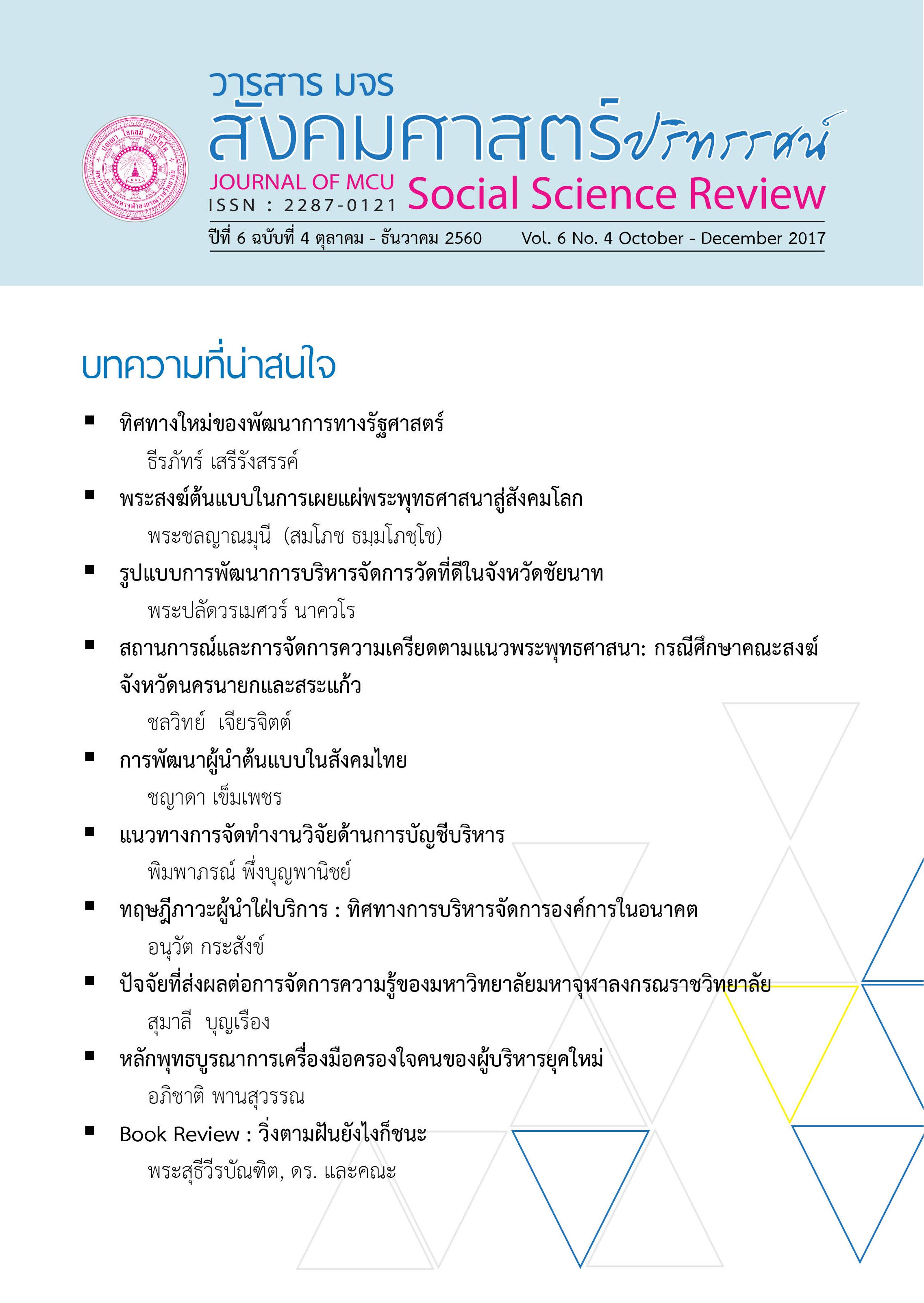การบริหารกิจการคณะสงฆ์ด้านการศาสนศึกษา ของพระสังฆาธิการในจังหวัดนครนายก
คำสำคัญ:
การบริหารกิจการคณะสงฆ์, การศาสนศึกษา, พระสังฆาธิการบทคัดย่อ
บทความวิจัยนี้ มีวัตถุประสงค์คือ 1) เพื่อศึกษาสภาพปัญหาทั่วไปในการบริหารกิจการคณะสงฆ์ด้านการศาสนศึกษาของพระสังฆาธิการในจังหวัดนครนายก 2) เพื่อศึกษาแนวคิด ทฤษฎีที่เกี่ยวข้องกับการบริหารกิจการคณะสงฆ์ด้านการศาสนศึกษาของพระสังฆาธิการในจังหวัดนครนายก3) เพื่อนำเสนอแนวทางการบริหารกิจการคณะสงฆ์ด้านการศาสนศึกษาของพระสังฆาธิการในจังหวัดนครนายก ใช้ระเบียบวิธีวิจัยแบบผสานวิธี (Mixed Methods Research) ระหว่างการวิจัยเชิงคุณภาพ (Qualitative Research) ที่ใช้การสัมภาษณ์เชิงลึก (In-depth Interview) จากผู้ให้ข้อมูลสำคัญ 25 รูป/คน เพื่อการบริหารกิจการคณะสงฆ์ด้านการศาสนศึกษาของพระสังฆาธิการ ก่อนจะนำข้อมูลที่ได้นำไปสู่การวิจัยเชิงปริมาณ (Quantitative Research)ที่ใช้การศึกษาวิจัยเชิงสำรวจ (Qualitative Research) จากกลุ่มตัวอย่าง 169 รูป โดยการสุ่มตัวอย่างแบบง่าย (Simple Random Sampling) เก็บรวบรวมข้อมูลโดยใช้แบบสอบถาม (Questionnaire)
ผลการวิจัยพบว่า
1. สภาพทั่วไปในการบริหารกิจการคณะสงฆ์ด้านการศาสนศึกษาของพระสังฆาธิการในจังหวัดนครนายก ด้านการวางแผน พระสังฆาธิการได้ดำเนินการให้มีความสอดคล้องกับนโยบายของคณะสงฆ์แต่ไม่มีการวางแผนระยะยาว ด้านการจัดองค์การ โครงสร้างขององค์กรดำเนินการตามรูปแบบที่เคยปฏิบัติมาไม่ได้ดำเนินการเชิงรุก การบังคับบัญชาที่ผ่านมาไม่สนองตอบต่อการพัฒนาด้านการศึกษาบาลีเท่าที่ควรขาดแรงจูงใจ ตลอดจนถึงกฎระเบียบที่เกี่ยวข้องกับสำนักเรียนไม่มีภาคบังคับยังเป็นแบบสมัครใจ ด้านการประสานงาน ยังขาดการดำเนินงานที่ชัดเจนในด้านนี้เป็นแบบค่อยเป็นค่อยไปตามสถานการณ์ ที่สำคัญ ด้านการควบคุม มีผู้ลงชื่อเรียนและสมัครสอบมาก แต่ผลการสอบผ่านไม่เกินครึ่งหรือน้อยกว่านั้นมาก จึงควรส่งเสริมสนับสนุนด้านการศาสนศึกษาเกี่ยวกับบาลีให้เป็นที่ยอมรับของคณะสงฆ์เพื่อการสืบทอดอายุพระศาสนาสืบไป
2. ผลการวิเคราะห์แนวคิดและทฤษฎีที่เกี่ยวข้องกับการบริหารกิจการคณะสงฆ์ด้านการศาสนศึกษาของพระสังฆาธิการ ผลการแจกแบบสอบถามแก่บุคลากรกลุ่มตัวอย่าง จำนวน 169 ชุด พบว่า มีความคิดเห็นต่อการบริหารกิจการคณะสงฆ์ด้านการศาสนศึกษาของพระสังฆาธิการ โดยภาพรวมอยู่ในระดับมาก เมื่อพิจารณาแต่ละด้านพบว่ามีความคิดเห็นต่อการบริหารกิจการคณะสงฆ์ด้านการ ศาสนศึกษาของพระสังฆาธิการแต่ละด้านอยู่ในระดับมากทุกด้าน เรียงตามลำดับได้ดังนี้ ด้านการจัดองค์การ มีค่าเฉลี่ย 4.23 ด้านการบังคับบัญชา มีค่าเฉลี่ย 4.19 ด้านการควบคุม มีค่าเฉลี่ย 4.17 ด้านการประสานงาน มีค่าเฉลี่ย 4.11 และด้านการวางแผน มีค่าเฉลี่ย 4.03 น้อยกว่าทุกด้าน แต่อยู่ในระดับมากเช่นกัน
3. ผลการวิเคราะห์แนวทางการบริหารกิจการคณะสงฆ์ด้านการศาสนศึกษาของ
พระสังฆาธิการในจังหวัดนครนายก พบว่า 1) ด้านการวางแผน การกำหนดนโยบาย มาตรการอันเป็นแนวทางปฏิบัติเพื่อบรรลุเป้าหมาย ผู้บริหารปฏิบัติงานทุกระดับก็ปฏิบัติไปตามแผนที่กำหนดไว้ มีการปรับปรุงแก้ไข และกำหนดแผนล่วงหน้าโดยประชุมปรึกษา กำหนดแผนปฏิบัติงาน ให้เป็นไปตามระยะเวลาที่กำหนดเพื่อให้บรรลุวัตถุประสงค์ 2) ด้านการจัดองค์การ การจัดระบบความสัมพันธ์ระหว่างงานกับบุคคลภายในหน่วยงานนั้นๆ โดยมีการมอบหมายภารกิจ อำนาจหน้าที่ และความรับผิดชอบ การจัดโครงสร้างการบริหารต้องให้สอดคล้องเป็นระบบและมีการกระจายอำนาจหน้าที่ กำหนดบุคคลรับผิดชอบอย่างมีเหตุมีผล บุคลากรรู้จักการดำเนินโครงการต่างๆ ให้เหมาะสมกับทรัพยากรอย่างเหมาะสม 3) ด้านการบังคับบัญชา ผู้บริหารระดับสูงสั่งให้ผู้ใต้บังคับบัญชา ปฏิบัติงานอย่างใดอย่างหนึ่ง และเป็นการตรวจสอบดูว่าเขาได้ปฏิบัติงานที่มอบหมายได้ตามศักยภาพหรือไม่ หน้าที่ผู้บริหารต้องใช้ความสามารถจูใจให้ผู้ใต้บังคับบัญชาปฏิบัติงานให้ดีที่สุด การมอบอำนาจหน้าที่การงานให้แก่บุคคลากรในสำนักเรียน หรือคณะบุคคลหน่วยงานรองลงไปปฏิบัติศาสนกิจ หรือดำเนินการแทนตามความเหมาะสมแก่ความรู้ความสามารถ 4) ด้านการประสานงาน ได้ดำเนินการตามกระบวนการจัดการเรียนการสอนต้องมีการประชุมบุคคลากรเพื่อมอบนโยบาย ตรวจติดตามนโยบาย ให้แนวทางการปฏิบัติเพื่อให้เป็นไปในทิศทางเดียวกัน การประสานงานแบ่งเป็น 2 ส่วน คือ ประสานงานภายในสำนักเรียนและ ประสานงานภายนอกสำนักเรียน 5) ด้านการควบคุม ได้การติดตามผลงานของบุคคลากรภายในสำนักเรียนเพื่อต้องการทราบแต่ละฝ่ายใต้ปฏิบัติงานเป็นไปตามเป้าหมายสำนักเรียน มีวิธีการแก้ไขปัญหาที่เกิดขึ้นอย่างต่อเนื่อง ที่สำคัญคือการป้องกันไม่ให้ย่อหย่อนต่อหน้าที่การงาน และละทิ้งหน้าที่การงานมีการกำกับดูแลการบริหารเป็นประจำด้วยตนเอง พร้อมทั้งมีการเสนอผลการบริหารประเมินผลการเรียนการสอนว่าสัมฤทธิ์ผลมากน้อยแค่ไหน รวมทั้งประเมินงานตามภาระหน้าที่ในแต่ละหน่วยงาน
เอกสารอ้างอิง
Jittima Phakpheang. (2015). The Model of Administrative according to Buddhadhamma of Provincial Administrative Organization in Lower Central Area. Dissertation Graduate School, Mahachulalongkornraja-
Vidyalaya University.
Nonphithak Paksahan. (2009). Water Human Resort Management for Protect of Flood in The River Chee-Moon In Ubonratchathani Province. Dissertation Graduate School : Mahachulalongkornrajavidyalaya University.
Suwat Inpraphai. (2014). The Participation of the People in Water Human Resources Management for in the Paasak River. Dissertation Graduate School: Mahachulalongkornrajavidyalaya University.
Thanat Keawcharearnphisan. (2014). Water Human Resort Management for Protect of Flood in The River Chee-Moon in Ubonratchathani Province. Dissertation Graduate School: Mahachulalongkornrajavidyalaya University.
Vilawan Kongsadee. (2009). Factors Affecting Learning Achievement of 52 ID Coded Students of Business Administration, Rajapruk College, Academic Year 2009 (Research Report). Funded by Research Fund of Research Center. Nonthaburi: Rajapruk College.
ดาวน์โหลด
รูปแบบการอ้างอิง
ฉบับ
ประเภทบทความ
สัญญาอนุญาต
ลิขสิทธิ์ (c) 2017 วารสาร มจร สังคมศาสตร์ปริทรรศน์

อนุญาตภายใต้เงื่อนไข Creative Commons Attribution-NonCommercial-NoDerivatives 4.0 International License.
เพื่อให้เป็นไปตามกฎหมายลิขสิทธิ์ ผู้นิพนธ์ทุกท่านต้องลงลายมือชื่อในแบบฟอร์มใบมอบลิขสิทธิ์บทความให้แก่วารสารฯ พร้อมกับบทความต้นฉบับที่ได้แก้ไขครั้งสุดท้าย นอกจากนี้ ผู้นิพนธ์ทุกท่านต้องยืนยันว่าบทความต้นฉบับที่ส่งมาตีพิมพ์นั้น ได้ส่งมาตีพิมพ์เฉพาะในวารสาร มจร สังคมศาสตร์ปริทรรศน์ เพียงแห่งเดียวเท่านั้น หากมีการใช้ภาพหรือตารางหรือเนื้อหาอื่นๆ ของผู้นิพนธ์อื่นที่ปรากฏในสิ่งตีพิมพ์อื่นมาแล้ว ผู้นิพนธ์ต้องขออนุญาตเจ้าของลิขสิทธิ์ก่อน พร้อมทั้งแสดงหนังสือที่ได้รับการยินยอมต่อบรรณาธิการ ก่อนที่บทความจะได้รับการตีพิมพ์ หากไม่เป็นไปตามข้อกำหนดเบื้องต้น ทางวารสารจะถอดบทความของท่านออกโดยไม่มีข้อยกเว้นใดๆ ทั้งสิ้น





